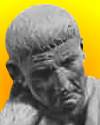 (source)
(source)
|
Aristippus The Cyrenaic
(c. 435 B.C. - 366 B.C.)
Greek philosopher who founded the Cyrenaic school of hedonism, the ethic of pleasure. As a desciple of Socrates, he, too, was interested in practical ethics. The original works of Aristippus have not survived. What little is known about him is recorded by Diogenes Laertius—mostly anecdotes of his sayings. (The image is a detail of a statue at the Palazzo Spada, Rome.)
|
Science Quotes by Aristippus The Cyrenaic (2 quotes)
Every common mechanic has something to say in his craft about good and evil, useful and useless, but these practical considerations never enter into the purview of the mathematician.
— Aristippus The Cyrenaic
Quoted in Robert Drew Hicks, Stoic and Epicurean (1910), 210.
Those who eat most, and who take the most exercise, are not in better health than they who eat just as much as is good for them; and in the same way it is not those who know a great many things, but they who know what is useful who are valuable men.
— Aristippus The Cyrenaic
In Diogenes Laertius, translated by Charles Duke Yonge, 'Life of Aristippus', The Lives and Opinions of Eminent Philosophers (1853), 83.
Quotes by others about Aristippus The Cyrenaic (2)
It is related of the Socratic philosopher Aristippus that, being shipwrecked and cast ashore on the coast of the Rhodians, he observed geometrical figures drawn thereon, and cried out to his companions:"Let us be of good cheer, for I see the traces of man."
In Vitruvius Pollio and Morris Hicky Morgan (trans.), 'Book VI: Introduction', Vitruvius, the Ten Books on Architecture (1914), 167. From the original Latin, “Aristippus philosophus Socraticus, naufragio cum ejectus ad Rhodiensium litus animaduertisset Geometrica schemata descripta, exclama uisse ad comites ita dicitur, Bene speremus, hominum enim vestigia video.” In De Architectura libri decem (1552), 218.
Aristippus said; “That those that studied particular sciences, and neglected philosophy, were like Penelope’s wooers, that made love to the waiting women.”
In 'A Collection of Apophthegms, New and Old' (1625). As given in Essays, Moral, Economical, and Political: A New Edition, With the Latin Quotations Translated (1813), No. 271, 341.
 In science it often happens that scientists say, 'You know that's a really good argument; my position is mistaken,' and then they would actually change their minds and you never hear that old view from them again. They really do it. It doesn't happen as often as it should, because scientists are human and change is sometimes painful. But it happens every day. I cannot recall the last time something like that happened in politics or religion.
(1987) --
In science it often happens that scientists say, 'You know that's a really good argument; my position is mistaken,' and then they would actually change their minds and you never hear that old view from them again. They really do it. It doesn't happen as often as it should, because scientists are human and change is sometimes painful. But it happens every day. I cannot recall the last time something like that happened in politics or religion.
(1987) -- 


